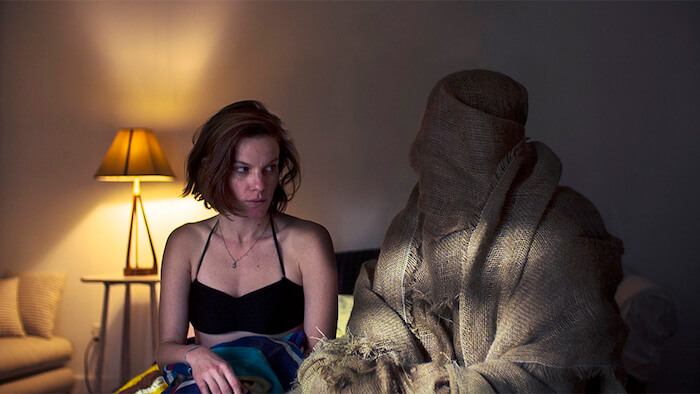… and a Ghost in the Sheets: Lace Crater


Lace Crater
Directed by Harrison Atkins
Opens July 29
In the tradition of the best genre fiction, Lace Crater addresses a real problem fantastically, thereby intensifying its emotional impact. Lace Crater is an STD drama but not a sulking Sundancer—it’s also a low-fi ghost story, produced by Joe Swanberg (who plays a small, classically Swanberg role: the jerky ex). When the ghost appears, he does so clad in burlap, head-to-toe—not just a baghead but a bagbody. He’s timid, soft-voiced and shy; he’s charmingly awkward, his flirtations hesitant and hushed—that is, he seems perfect for the woman he’s courting.
She’s Ruth (Lindsay Burdge, effectively rattled), who seems to have no job or daily responsibilities beyond getting high and playing The Sims. She’s a tentative person whose story writer–director Harrison Atkins tells tentatively. She meets her ghost on an overnight trip to the Hamptons with her friends, also of seeming privilege, where they stay in a spacious vacation home belonging to one of their families. They share stories of international travel and drop ecstasy. Atkins shoots these scenes like they’re part of a documentary: in odd angles seemingly dictated by the mise-en-scène rather than vice versa, swinging the camera between interlocutors. It’s unsettling, suggesting something lurking, something to look out for.
That something is the guest-house ghost (Peter Vack), with whom Ruth has sex before it’s back to Bushwick, where her GP is a standup comedian. (Oh, Brooklyn.) There she manifests odd physical symptoms, such as spontaneous vomiting and peeling skin. Moments go missing, and she wakes up mornings sopping wet. In the tradition of Repulsion and all its successors, up to Queen of Earth, she unravels; she hallucinates horrors, while Atkins’s camera starts going in and out of focus.
Lace Crater feels like an impressionistic allegory, fusing horror with shame, in which sex has debilitating health and social effects—especially, unfairly, for women. The surreality and absurdity of the fallout of her ghost-transmitted, “uncommon” infection hints at the confusion and guilt and ostracizing that many surely experience upon a diagnosis. “I didn’t do anything wrong!” Ruth shrieks repeatedly at her friends (including the likable Keith Poulson!)—because they treat her as though the opposite is true. Having an STD, Atkins suggests, can start to feel like being a ghost in a burlap sack.
You might also like 




















